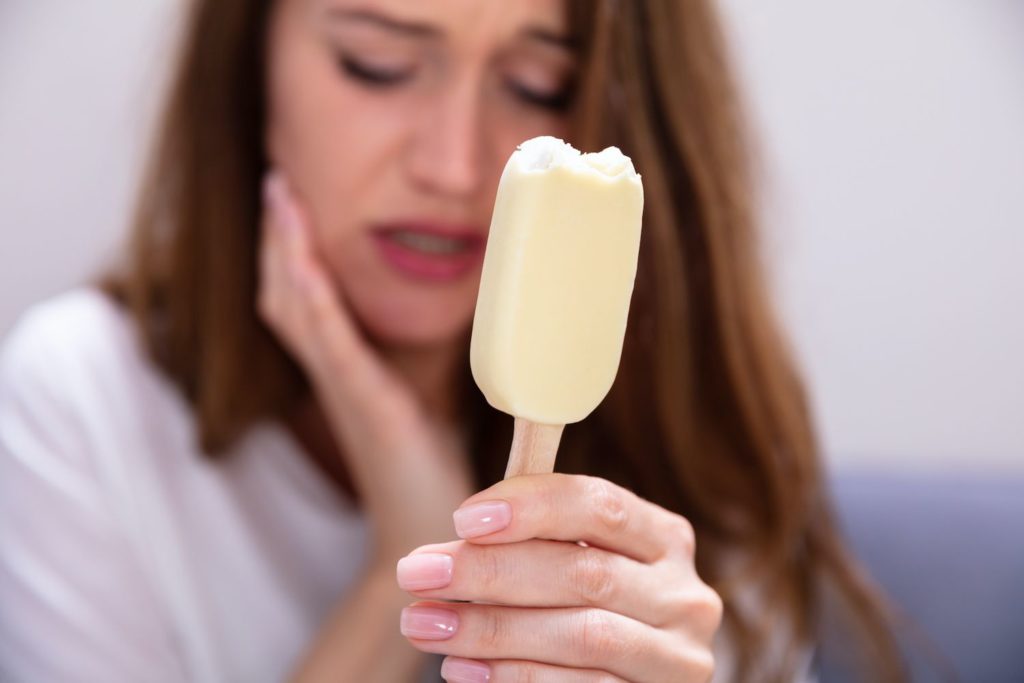Sensitive teeth can interfere with your life and be extremely painful and uncomfortable. This sensation is typically caused by exposure to the tooth’s underlying layer, called dentin, to external stimuli. This may include hot, cold, acidic, or sweet food and drinks. Sometimes, even air can trigger tooth sensitivity and a painful sensation. Dr. Jack Zhang is an expert dentist who offers several treatments to address sensitive teeth in Cary, NC. Our dental office also treats more dental concerns for patients in and around Cary, North Carolina.

What Causes Sensitive Teeth?
Sensitive teeth can be caused by several factors, including:
Tooth Decay
Poor oral hygiene habits cause this common dental problem. Tooth decay will eat away at the outer layer of teeth, called tooth enamel, which exposes the dentin layer. This will result in tooth sensitivity and the pain and discomfort that accompanies it.
Gum Disease
This dental disease is also a direct result of not taking proper care of your teeth and gums. Gum disease will cause your gums to recede. This can expose the dentin and tooth roots which will lead to sensitivity.
Brushing too Hard
When you brush your teeth too hard or with a toothbrush with stiff bristles, you will wear down the enamel. Once the enamel is worn down, it exposes the dentin layer.
Teeth grinding
This is an unfortunate habit many people experience while sleeping. When they grind their teeth or clench their jaw, it slowly causes the enamel to wear away and exposes the dentin.
Certain Dental Procedures
It is common for teeth to become sensitive after certain dental procedures. This includes treatments such as teeth whitening, dental fillings, preparing a tooth for a dental crown, and root canals.
Broken Dental Restorations
If you have a broken dental crown, dental bridge, dental filling, inlay, or onlay, it can expose many sensitive areas of the tooth.
Treatments for Sensitive Teeth in Cary, NC
There are several treatments available for sensitive teeth, including:
Dental bonding
Dental bonding involves applying a tooth-colored resin to the affected area to protect the dentin layer and reduce sensitivity.
Root canal
In severe cases, a root canal may be necessary to remove the damaged or infected tissue, causing sensitivity.
Dental Filling
A simple dental filling will treat a tooth cavity by filling in the hole that exposes the dentin and stops the sensitivity.
Gum Disease Treatment
Scaling and root planing is like a deep cleaning where your dentist will scrape away the plaque and tartar that have built up on your teeth. Then they will smooth out the tooth roots to discourage further buildup.
Dental Restoration
A dental restoration such as a dental crown, inlay, or onlay can help restore a tooth that has decay or that has damage. Also, if your dental restoration has been damaged, we can replace it.
Desensitizing toothpaste
Desensitizing toothpaste can help to block the sensations of pain and discomfort by creating a barrier over the dentin layer.
Fluoride treatment
Fluoride treatment can help to strengthen enamel and reduce sensitivity.
Gum graft
A gum graft involves taking tissue from another part of the mouth and attaching it to the affected area to cover exposed roots and reduce sensitivity. Dr. Zhang can refer you to a local specialist.
How to Avoid Sensitive Teeth
There are several steps that can be taken to avoid sensitive teeth, including:
- Brush and floss your teeth regularly: Brushing and flossing your teeth every day will help avoid common dental problems such as tooth decay and gum disease, which can lead to sensitivity.
- Use a soft-bristled toothbrush: When you use a soft-bristled toothbrush, it will help prevent enamel erosion and reduce tooth sensitivity.
- Limit acidic and sweet foods and drinks: When you limit acidic foods and drinks such as soda, citrus fruits, and vinegar, it helps prevent enamel erosion. When you limit your consumption of sugar, you reduce your chances of tooth decay. Both will reduce tooth sensitivity.
- Wear a mouthguard: There are several types of mouthguards available to protect teeth. A night mouthguard will protect your teeth from grinding while you sleep. A sports mouthguard will protect your teeth from trauma. Both will prevent damage and erosion to your teeth and prevent tooth sensitivity.
- Regular dental appointments: Visiting your dentist in Cary, NC will prevent sensitive teeth. During regular check-ups, we will clean your teeth and identify and treat any dental problems before they lead to sensitivity.
If you require treatment for sensitive teeth in Cary, NC, contact Kildaire Family & Cosmetic Dentistry today. You can request an appointment by filling out the online form. Dr. Zhang can examine your teeth and find the right treatment to help you.
